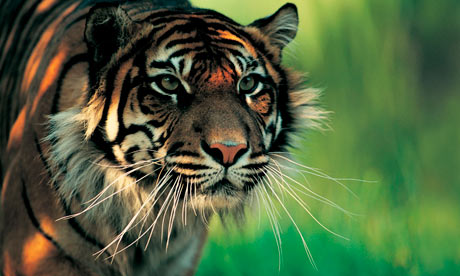

In about a week a lot of people will be meeting in St. Petersburg for the 2010 Global Tiger Summit. The purpose of the summit is simple, to save the remaining number of tigers that exist in the wild, to bring about changes in management of their environment that will lead to the strengthening of the number of tigers in the wild. This will be done through the co-ordination of a number of Asian countries, including Russia. The Siberian Tiger, also known as the Amur Tiger has seen a bit of a comeback from extinction, but its far from safe. Apparently Russia needs to strengthen its laws regarding poaching of the animal. It's still in trouble, even if Prime Minister Vladimir Putin has seen himself as the protector of this animal.
If the numbers are correct, there are only 3200 Tigers in the wild. When you think about it, that's a chilling number. It also tells us the planet is still in a heap of trouble. Tiger exists best in places of great biodiversity, it's the top of the food chain so where there is food, there is tigers. Where there is habitat preservation and controls on hunting ( ie DON'T HUNT), there will be tigers.
What makes this group fascinating is the fact that, first of all, it was started by the head of the World Bank. I know, that's amazing, usually the World Bank is encouraging the devastation of natural habitats so countries can pay off their debts. I suppose that should be one good thing in their favour.
The second is all the nations recognize the problem. They know they must protect and change the direction of the numbers, no one is saying, 'keep hunting tigers, keep destroying their habitat'. Well, they don't say it, but they still allow it.
The problems facing the Tiger is ones we are familiar with, I could add to the list deforestation. This has to be stopped. We are destroying how many million of hectares so we can have coffee and rubber, or open areas to exploration and exploitation of minerals. We need to really consider what we are doing to the planet.
The Guardian, one of the great newspapers when it comes to environmental issues featured the summit recently.
I know we can see Tigers in zoos, and while it could be argued they offer these wonderful animals a chance to survive. Still there is something wrong with seeing such a great Cat behind bars.

Leonardo DiCaprio recently had an Op-Ed piece in the Washington Post, he argues for the need to save the Big Cat. He writes this:
Because saving tigers is a compelling and cost-effective means of preserving so much more that is essential to life on Earth. The tiger is what conservationists call an "umbrella" species. By rescuing them, we save everything beneath their ecological umbrella - everything connected to them - including the world's last great forests, whose carbon storage mitigates climate change.
For example, Indonesia's 18 million-acre peat forests, home to the Sumatran tiger, contain 36 percent of the world's tropical carbon stores. So if we protect tigers by stopping deforestation, we also salvage the carbon storage these forests provide. A forest that can't support tigers isn't of much use to us, either.
One of the key saying that came out of the Kathmandu Tiger Workshop 2009 was:
Saving wild tigers is our test; if we pass, we get to keep the planet
It would be nice to finally pass one test.

No comments:
Post a Comment